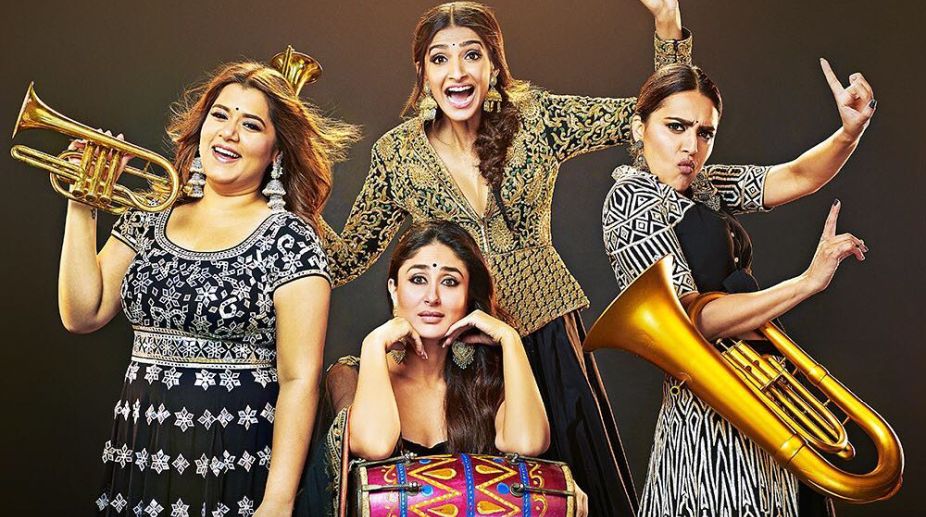Swara Bhasker slams the ‘national cyber debate’ around her wardrobe post-marriage
'Raanjhanaa' actress Swara Bhasker takes to X to slam trolls criticising her wardrobe choices after her marriage.

Veere Di Wedding (Photo credits: Instagram)
Film: Veere Di Wedding
Director: Shashank Ghosh
Rating: ***
Advertisement
Cast: Sonam Kapoor Ahuja, Kareena Kapoor Khan, Swara Bhasker, Sumeet Vyas and Shikha Talsania
With the rise of bromanctic films like Pyaar Ka Punchnama series and the latest blockbuster Sonu Ki Titu Ki Sweety, it was quite obvious that a feminist approach to such genre would be visible soon and ‘Veere DI Wedding’ delivers such a tale of female bromance.
Meera (Shikha Talsania) is a happily married woman after eloping with her American husband because her family didn’t accept him. Sakshi (Swara Bhaskar) has an image of a spoilt brat who always indulges herself in alcohol and is a party freak; her marriage is on the brink of divorce. Avni (Sonam K Ahuja) is a divorce lawyer who is desperately looking for someone in the hope for love marriage. Kalindi (Kareena Kapoor Khan) loves her boyfriend Rishabh (Sumeet Vyas) but doesn’t want to marry him in order to avoid the stressful part and parcel of marriage. These are the four female leads of the film and it is a tale of them struggling through the thick and thin of life together.
The outrageousness of the script lies in the dialogues mainly – the dialogues seem normal and not something forcefully plugged in to increase the shock value. Many conservative people will surely have objection with them like “How can a girl say those things” or “How can they show such indecent gestures” but trust me there are several girls out there like this especially in the urban setup of the film and it is completely normal to be like that. The screenplay plays the spoilsport too as it keeps stretching at the end and many would be like “Just get over with it”. The director Shashank Ghosh really doesn’t know when to call curtains for the film as it just gets long and long at the end. He even doesn’t let us know why there were repeated quarrels between the parents of Kalindi or why exactly things were wrong between Kalindi’s dad and uncle (They just touched and left this part in the film). Many such things made several loopholes in the script; maybe he thought touching these topics would lengthen the film even more.
Shikha as the cute mother in the girl gang of four was adorable. She had that Punjabi feel all over her character and performed it right. Sonam K Ahuja was amazing in the last outing of the director Shashank Ghosh’s Khoobsurat but here she goes over the top time to time. I hope she does better in Sanju. Kareena Kapoor Khan delivered a good comeback and nails her role. Swara Bhaskar is the best of the four in acting. She has always done roles in which she is mostly a rural or low-class girl but here she nails her role of the richest brat in the film who has a flask always somewhere in her dress with no pockets. Sumeet Vyas and Vishvas Kini do their job with perfection too, especially Vishvas as he supports the film with comedic tone.
The songs live-up to the tone of the film and songs like Laaj Sharam and Bhangra Ta Sajda excel. The problem arrives when the film’s concept starts to contradict itself. The film is touted as a feminist film but the girls claim that they are like ‘bros’ in one initial scene, why not ‘sisters’? The promo song Taareefan had a role-reversal concept of sleazy songs in Bollywood but why let Baadshah sing it, I mean there is the talented Neha Kakkar if they needed a good female rapper. I think the film would have served better purpose if it was a female director like how Zoya Akhtar treated female characters with normalcy in Zindagi Na Milegi Dobara and Luck By Chance. Even the scene where Avni (Sonam) yells at her probable fiancé that he is a ‘bloody’ mother-lover is plain & simple overreaction from her character’s side; just because he didn’t want to be involved in bodily-pleasures doesn’t mean he wants a maid in the form of housewife (Exactly how Avni describes him). I mean if a girls says ‘no’ in that situation then she is shown as ‘Sanskari’ but here the boy says ‘no’ and he is shown as ‘Chauvinist’ – Well No means No on both sides.
Shashank tries too hard to make it a feminist film but in the end it is a bore-fest barring few scenes which come at few intervals. He does well in exploring the sexual needs of women though and shows why intercourse or love is necessary in a successful marriage. The film is only watchable of you’re not conservative and are totally cool with usage of cuss words but be ready to be bored time to time.
(The writer is an independent contributor)
Advertisement